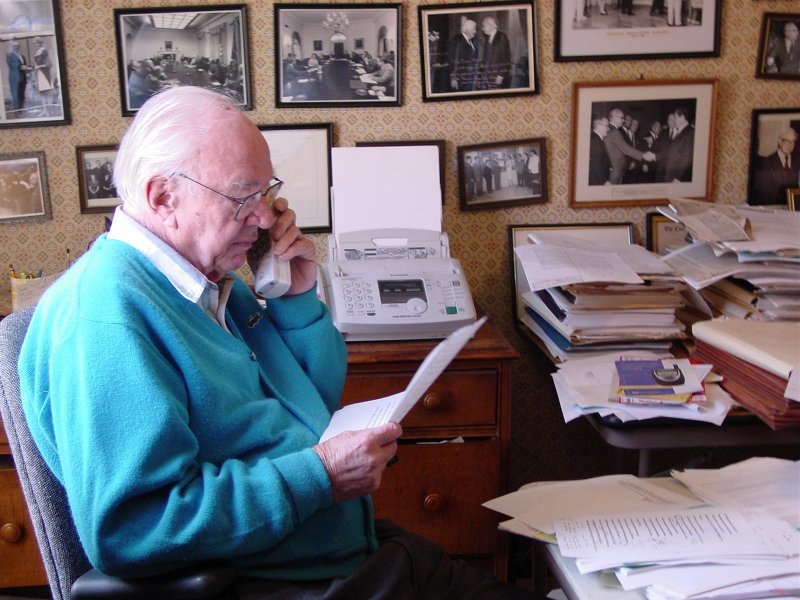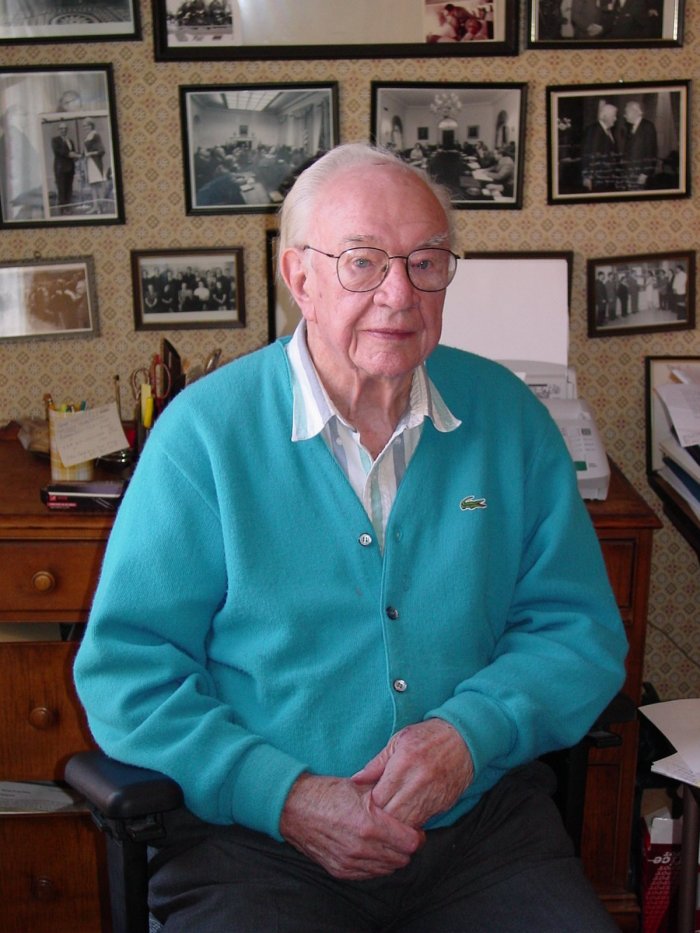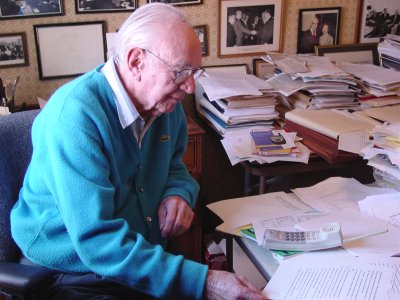Robert M. Ball
Robert M. Ball has had a long career in the field of Social Security, dating back to 1939 when he joined the Social Security Board as a Field Assistant in a New Jersey field office. In 1942 Ball moved to Social Security's headquarters in Baltimore where he quickly became the organization's chief staff expert on the issue of expanding coverage. Soon thereafter he accepted an assignment with the Board's Office of Training, where he displayed his natural gifts as a communicator and educator.
Leaving the agency briefly around 1945 Ball became a principal in an educational institute, and when the 1948-1949 Social Security Advisory Council was formed, Ball was tapped to be its Staff Director. This Council produced the watershed 1950 Amendments, which Ball had a major hand in shaping.
Returning to the Social Security Administration (SSA)
in 1949, Ball was made Assistant Director of the Bureau of Old Age and
Survivors Insurance, and eventually, Deputy Director and Acting Director.
In 1962, President Kennedy appointed Ball, Commissioner of Social Security,
a position he held under three Presidents--retiring in 1973. During his
time at SSA, both the disability program and Medicare were enacted, and
Ball was again very influential in the development of both of these landmark
pieces of legislation.
Following his retirement, Ball went on to be one of the most active and
prolific consultants and experts on Social Security and related topics.
He was a Senior Scholar at the Institute of Medicine from 1973-1980 and
since 1980 has been a writer, lecturer and consultant. In 1981-1982 Ball
was an influential member of the Greenspan Commission, which resulted
in the 1983 Amendments--the last major piece of Social Security legislation
in the 20th century. Writing in 2001, historian Edward D. Berkowitz described
Ball as "the major non-Congressional player in the history of Social
Security in the period between 1950 and the present."
Ball's Detailed Curriculum Vitae
Photo Gallery

Robert M. Ball on the phone in his home office in Alexandria, Virginia-- 11/20/01. SSA History Archives.

Robert M. Ball in his home office in Alexandria, Virginia -- 11/20/01. SSA History Archives.
Interviews
This oral history is the product of an extended series of interviews conducted throughout the year 2001. The interviewer for SSA was Larry DeWitt, SSA Historian. All sessions took place at Mr. Ball's home in Alexandria, Virginia.
In printed form, the text of the interviews approaches 280 pages in length. It is by far the most extensive interview Mr. Ball has given and the subjects discussed range widely and deeply over many topics related to Social Security.
The raw transcripts have been reviewed and edited by the interviewee.
Soundclip from the interviews:
In this clip, from the May interview, Mr. Ball gives his view of the financing basis of the Social Security system prior to and after the 1983 Amendments. He discusses the question of whether the large build-up in the Trust Funds as a result of the 1983 changes was a planned or unintended consequence of the 1983 law and whether it is most accurate to describe the Social Security system as a pay-as-you-go or a partially pre-funded system. (The excerpt is 6 minutes and 46 seconds in length.)
Clip in MP3 Format (6.3 meg file)
Clip in RealAudio Format (5.1 meg file)
Clip in Windows Media Player Format (1.6
meg file)
The Interviews
Interview #1:
January 29, 2001
Topics:
World War II Years; 1948-49 Advisory Council; Alvin David; Bureau
of Old Age and Survivors Insurance; Wilbur Cohen; Arthur Altmeyer;
actuarial estimates and benefit increases; Hobby Lobby; Vic Christgau;
development of disability benefits; appointment as Commissioner; Kennedy-Mills
bill; etc.
Interview #2:
March 12, 2001
Topics:
Management of the Bureau; Jack Futterman; Hugh McKenna and other Bureau
Directors; extensions of coverage; Altmeyer's departure; Hobby Lobby;
construction of SSA Headquarters; early computers at SSA; creation
of Commissioner of Welfare position, separation from SSA; Art Hess;
1965 Advisory Council; War on Poverty; civil rights movement; labor
management relations; etc.
Interview #3:
April 3, 2001
Topics:
Appointment as Commissioner; Curtis Subcommittee hearings; Harrison
Subcommittee hearings; early efforts on health insurance; development
of Medicare; Elizabeth Wickenden; Wilbur Cohen; Arthur Flemming; implementation
of Medicare; etc.
Interview #4:
May 1, 2001
Topics:
Ted Kennedy bill on health insurance and Kennedy-Mills bill; automatic
COLAs; 1972 Amendments; Wilbur Mills; "decoupling" and the
"Notch;" 1977 Amendments; 1976 Presidential election; Carter
Administration proposals; Church Amendment; etc.
Interview #5:
May 22, 2001
Topics:
Senator Moynihan; Reagan Administration proposals; Greenspan Commission;
Social Security Statements; current reform proposals; 1972 and 1977
Amendments; Frank Church; position of Democrats in Congress prior
to 1983 Amendments; members and staff of Greenspan Commission; work
of the Greenspan Commission; Greenspan Commission proposals and Congressional
debate; status of Trust Funds post-1983 Amendments; passage of 1983
Amendments; etc.
Interview #6:
October 25, 2001
Topics:
Arthur Altmeyer; Professor Berkowitz' biography of Ball; Nancy Altman
biography of Ball, Cohen and Myers; John Trout biography of Ball;
Frank Bane; John Corson; Altmeyer's personality and management style;
Altmeyer's memoirs; Altmeyer's personal history; John Winant; Wilbur
Cohen; Tom Eliot; Maurine Mulliner; background to the 1994-96 Advisory
Council; Reagan Administration proposals; 1991 Advisory Council; personnel
of the 1994-96 Advisory Council; work of the 1994-96 Advisory Council;
Ball's "Social Security Plus" proposal; the three competing
proposals in the 1994-96 Advisory Council; Bush Reform Commission;
etc.
Interview #7:
November 20, 2001
Topics:
Founding of the National Academy of Social Insurance (NASI); Karl
de Schweinitz; Henry Aaron; Alicia Munnell; Bert Seidman; Senators
Moynihan and Heinz; Marshall Field Foundation; Carnegie Corporation;
Pam Larson; NASI membership policy; NASI report on the Notch; Hans
Riemer and 2030 group; Save Our Security organization; elimination
of Student Benefits; 1991 Advisory Council; Social Security Advisory
Board; Stan Ross; President Bush's Commission on Social Security;
Social Security reform; etc.
